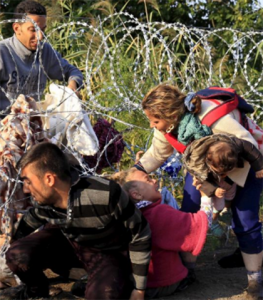EU raps Hungary over asylum seeker pushbacks
The European Union’s border agency Frontex has suspended its operations in Hungary, after an EU court ruled the country had broken the law by preventing migrants from seeking asylum.
“Our common efforts to protect the EU external borders can only be successful if we ensure that our cooperation and activities are fully in line with EU laws,” a statement from Frontex said.
 It came after the European Court of Justice found flaws in Hungary’s asylum procedures, including the illegal pushback of migrants arriving from Serbia.
It came after the European Court of Justice found flaws in Hungary’s asylum procedures, including the illegal pushback of migrants arriving from Serbia.
It also said laws forbidding asylum seekers to remain in the country throughout their appeal process were illegal and the court criticised the detention of migrants in “transit zones”.
“Hungary has failed to fulfil its obligations under EU law in the area of procedures for granting international protection,” the ruling said.
In 2015, at the peak of a crisis which saw thousands of would-be migrants and refugees arriving in southeast Europe and heading north and west, Hungary stood in their way.
Prime Minister Viktor Orban’s nationalist anti-immigration government corralled migrants into transit zones and limited their ability to apply for asylum.
Hungary’s government often at loggerheads with the EU over migration and refugee policy, and Mr Orban’s government has accused Brussels of trying to force it to accept mass immigration.
The Hungarian Helsinki Committee (HHC), a non-government refugee advocacy group said that Hungary had sent back more than 4,400 migrants since the EU court ruling.
Meanwhile, the United Nations has voiced concern over increasingly frequent pushbacks and expulsions of refugees at Europe’s borders, warning that the principle of asylum itself was under attack on the continent.
The UN refugee agency UNHCR called on countries to create independent monitoring mechanisms to ensure the right to seek asylum and to investigate violations.
Gillian Triggs, UNHCR Assistant High Commissioner for Protection, said the agency had “received a continuous stream of reports of some European states restricting access to asylum, returning people after they have reached territory or territorial waters, and using violence against them at borders”.
“The pushbacks are carried out in a violent and apparently systematic way,” she said.
“Boats carrying refugees are being towed back. People are being rounded up after they land and then pushed back to sea,” said Prof Triggs, Australia’s former Human Rights Commission chair.
There have also been reports of violence and abuse by state forces.
The UNHCR also warned that people arriving by land were also being informally detained and forcibly returned to neighbouring countries “without any consideration of their international protection needs”.
The 1951 Refugee Convention, the European Convention on Human Rights and EU law requires states to protect people’s right to seek asylum and protection, even if they enter a country illegally, the UNHCR said.
International law also protects against so-called refoulement — returning asylum seekers to places where they risk persecution and torture, it said.
“Respecting human lives and refugee rights is not a choice, it’s a legal and moral obligation,” Prof Triggs said.
“While countries have the legitimate right to manage their borders in accordance with international law, they must also respect human rights. Pushbacks are simply illegal,” she said.
The number of migrants, refugees and asylum seekers arriving in Europe has been steadily declining. In 2020, some 95,000 arrived by sea and land, down 23 percent from 2019, and down 33 percent from 2018.
“With so few arrivals to Europe, this should be a manageable situation,” Prof Triggs said.
“It is regrettable that the issue of asylum remains politicised and divisive despite such declining numbers,” she said.
Some European countries were carrying a “disproportionate responsibility” in taking in new arrivals and the UNHCR has called on other countries on the continent to do their share and demonstrate “solidarity”.
It also urged European countries to uphold commitments to refugee protection, meaning they should admit asylum seekers at their borders, rescue those stranded at sea and allow them to promptly disembark.












